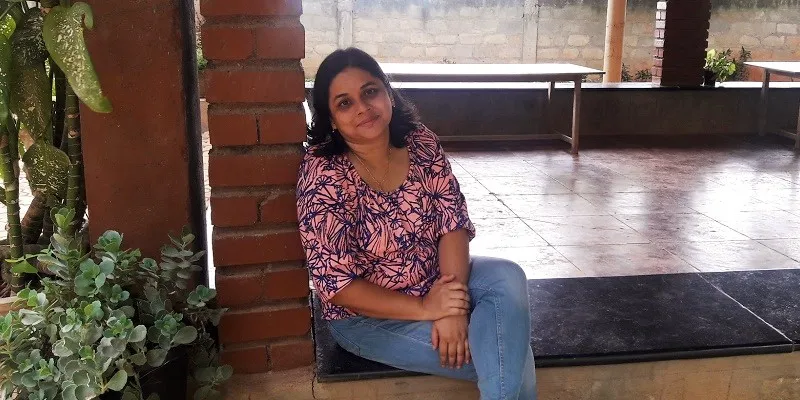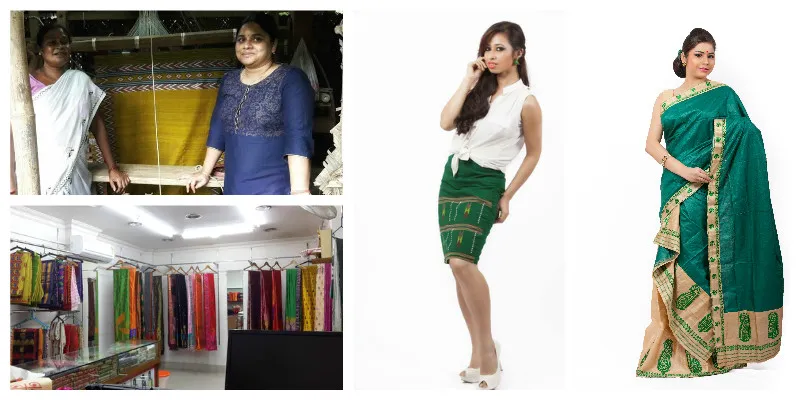Thanks to Daisy Nath, the gleam of handwoven Assamese silk from Guwahati is brightening wardrobes across the country
Do circumstances decide our destination? Can we carve out the path to our chosen goals whatever be the hand dealt by destiny? In the case of Daisy Nath, it was a mix of both circumstances and her determination that led her to be the entrepreneur she is today. Daisy’s Assam Silk Shopping was one of the finalists in the North East Award in the e-commerce category in 2014, and she set up a retail outlet in Guwahati last year. From working with Wipro in Bangalore as a project engineer to starting her own handloom brand while providing employment to more than 30 weavers, Daisy, at 33, has come a long way in a few short years.
The oldest among three daughters, Daisy was a teenager at the time of her Army officer father’s untimely demise. Though her mother was in government service and the family was financially stable, Daisy still felt a strong desire to get her career on track so she could be a support system and role model to her younger sisters. She completed her MSc from Bangalore University and joined Wipro in 2008, but her love for the city of startups also ignited in her a dream of doing something on her own.

In the meantime, life happened as it often does, and Daisy went on to become a new bride and a new mother in the span of a few years. When she was back home in Guwahati on her maternity leave, she started thinking seriously about setting up her own venture. A visit to the silk village, Sualkuchi, proved to be the final catalyst. Daisy has always loved sarees, especially Mekhela Chadar, which is why she felt the need to start up in the domain of traditional silk sarees. After her maternity leave, she rejoined Wipro and continued working for a year before finally quitting to follow her dreams.
After launching the Assam Silk Shopping website in July 2012, she was lucky to get the first order, of Rs 50,000, from a Sattriya dancer (classical dance of Assam) from France. Daisy recalls, “She needed the dance costume in silk which was custom made for her. After that initial order, though, orders were sporadic, since at that time e-commerce was not that popular and people were sceptical about purchasing premium products like silk sarees without seeing the same. In time, the business picked up.” Today, she is based out of Bangalore and travels frequently to Guwahati to oversee the work by her team.
The Indian weavers
Weavers, weaving at fall of night,
Why do you weave a garment so bright?
Like the plumes of a peacock, purple and green,
We weave the marriage veils of a queen.
As Sarojini Naidu described so beautifully, the weaving of colourful Indian fabric on a handloom is a thing of beauty. The rhythmic movements of the looms still hold the secret to this ancient art, unaffected by new-age machinery and chemicals. Of course, it is easy to romanticise their work, but the bitter truth is that many of the artisans are often battling poverty.
Weaving is tradition in Assam and there was a time when every girl in a family used to know weaving. Even my mother and mother-in-law are experts in weaving. Now, people have become busy with the modern lifestyle and most young people don’t know how to weave. The handloom industry is dying and people like me are trying to revive it. Sualkuchi is popularly known as the Manchester of Assam, and is one of the world’s largest weaving villages. In this village, almost every family has one loom and 90 percent of the population is engaged in weaving exquisite silk fabrics. Muga silk, also known as golden silk due to its natural golden colour and durability, is found only in Assam.
Daisy currently works with three individual families with around 10 weavers for cotton and 25 weavers for other fabrics including silk. Her weavers operate 25 looms just for silk. Whenever there are additional requirements, she rents extra looms to meet the demand.

Daisy says, “From 2012 to 2016 the scenario has changed a lot. Now Mekhela Chadar has got recognition on a platform like Lakme Fashion Week, and people have started buying them online. When I started, though, the weavers and owners of the looms were not enthusiastic about online sales. They felt their designs could be copied by anybody, so I had a tough time convincing them. Now, since I have opened my own retail outlet and also have my own looms, I don’t have to be dependent on anyone and can sell my own products. The local weavers have also realised that selling online is a new channel of income and I am glad about my contribution to social responsibility by helping them in earning their living.”
Business acumen
Daisy’s retail outlet named ‘Tatkala’ was opened in November 2015 in Guwahati. She has a team of three people in Assam for managing looms, the retail outlet and stock management, and one technical person who manages the website. According to Daisy, Assam Silk Shopping has grown almost 200 percent in the last three years. The number of orders varies from month to month, but sales are generally high between September and April and revenues during the time frame can go up to Rs 30 lakhs. Fabrics in the affordable range of between Rs 500 to Rs 3000 sell faster online while expensive sarees, where the touch and feel matters to the customers, do well at the store. But Daisy has noticed that repeat orders of this type are then placed online once the client is familiar with the quality of the product.
Daisy’s future plans include using pure handloom fabric for making different garments like kurtas, tops, pants, shirts, skirts, and dresses under her own brand name.
Work and family
When Daisy’s son was a baby, she was okay with the slow growth of the business since she wanted to devote quality time to him. Now that he is almost five years old and goes to school, work-life balance is much easier, feels Daisy. Daisy’s sisters are married and have settled down in Bengaluru and the USA, and so she is in a good place on the personal front. Now, Daisy wants to take Assam Silk Shopping to greater heights.
Something she would like to tell other aspiring women entrepreneurs is, “Sometimes you have to put in extra effort to manage home and work. But I found when I am doing something that gives me happiness, I get the energy and will power to go the extra mile.”







